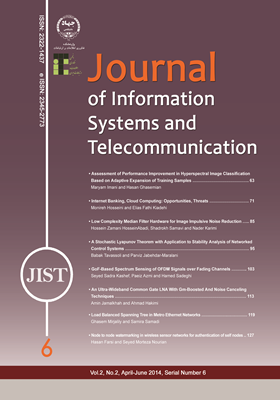Load Balanced Spanning Tree in Metro Ethernet Networks
محورهای موضوعی : Network ManagementGhasem Mirjalily 1 , Samira Samadi 2
1 - Yazd University
2 - Yazd University
کلید واژه: Metro Ethernet Network, Spanning Tree, Load Balancing, Shortest Path Selection,
چکیده مقاله :
Spanning Tree Protocol (STP) is a link management standard that provides loop free paths in Ethernet networks. Deploying STP in metro area networks is inadequate because it does not meet the requirements of these networks. STP blocks redundant links, causing the risk of congestion close to the root. As a result, STP provides poor support for load balancing in metro Ethernet networks. A solution for this problem is using multi-criteria spanning tree by considering criterions related to load balancing over links and switches. In our previous work, an algorithm named Best Spanning Tree (BST) is proposed to find the best spanning tree in a metro Ethernet network. BST is based on the computation of total cost for each possible spanning tree; therefore, it is very time consuming especially when the network is large. In this paper, two heuristic algorithms named Load Balanced Spanning Tree (LBST) and Modified LBST (MLBST) will be proposed to find the near-optimal balanced spanning tree in metro Ethernet networks. The computational complexity of the proposed algorithms is much less than BST algorithm. Furthermore, simulation results show that the spanning tree obtained by proposed algorithms is the same or similar to the spanning tree obtained by BST algorithm.
Spanning Tree Protocol (STP) is a link management standard that provides loop free paths in Ethernet networks. Deploying STP in metro area networks is inadequate because it does not meet the requirements of these networks. STP blocks redundant links, causing the risk of congestion close to the root. As a result, STP provides poor support for load balancing in metro Ethernet networks. A solution for this problem is using multi-criteria spanning tree by considering criterions related to load balancing over links and switches. In our previous work, an algorithm named Best Spanning Tree (BST) is proposed to find the best spanning tree in a metro Ethernet network. BST is based on the computation of total cost for each possible spanning tree; therefore, it is very time consuming especially when the network is large. In this paper, two heuristic algorithms named Load Balanced Spanning Tree (LBST) and Modified LBST (MLBST) will be proposed to find the near-optimal balanced spanning tree in metro Ethernet networks. The computational complexity of the proposed algorithms is much less than BST algorithm. Furthermore, simulation results show that the spanning tree obtained by proposed algorithms is the same or similar to the spanning tree obtained by BST algorithm.


